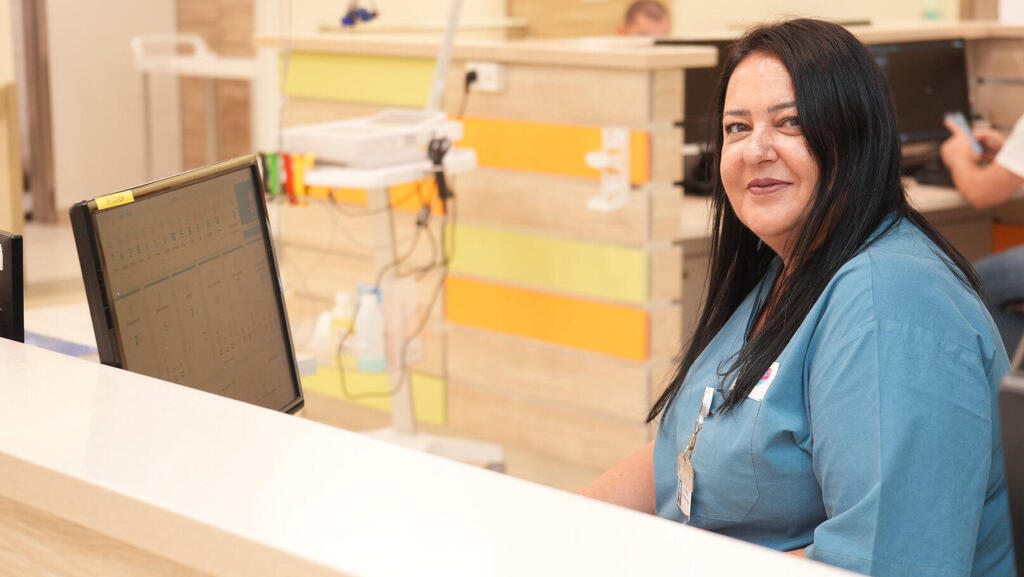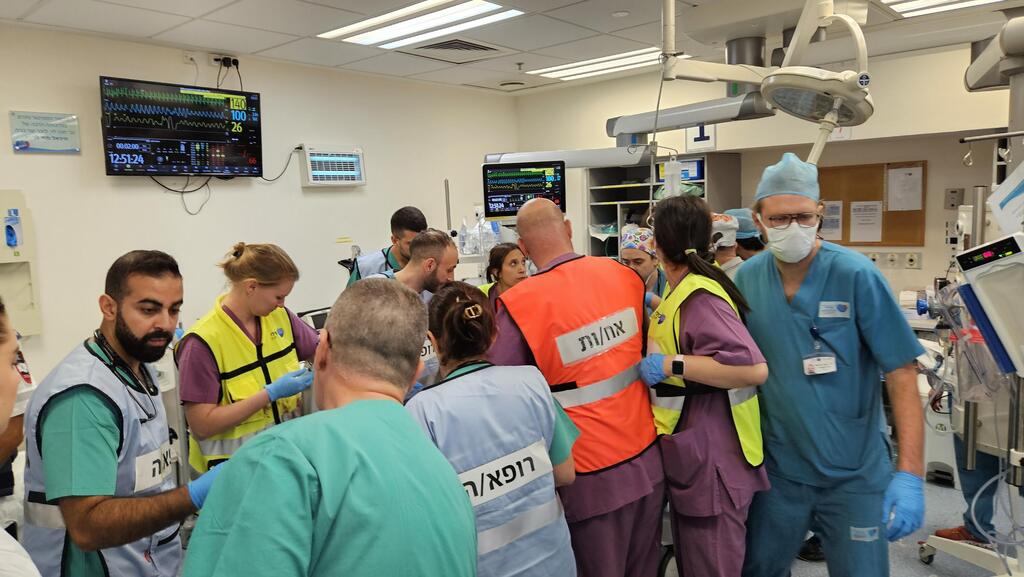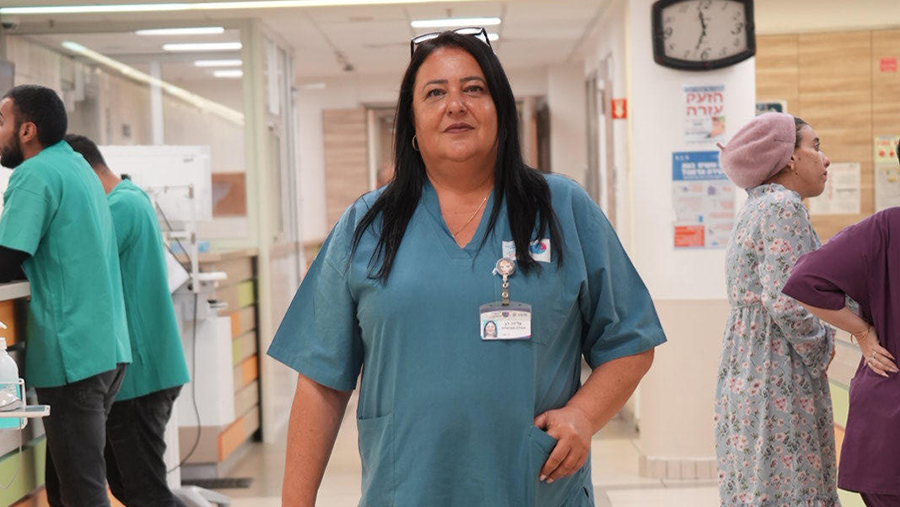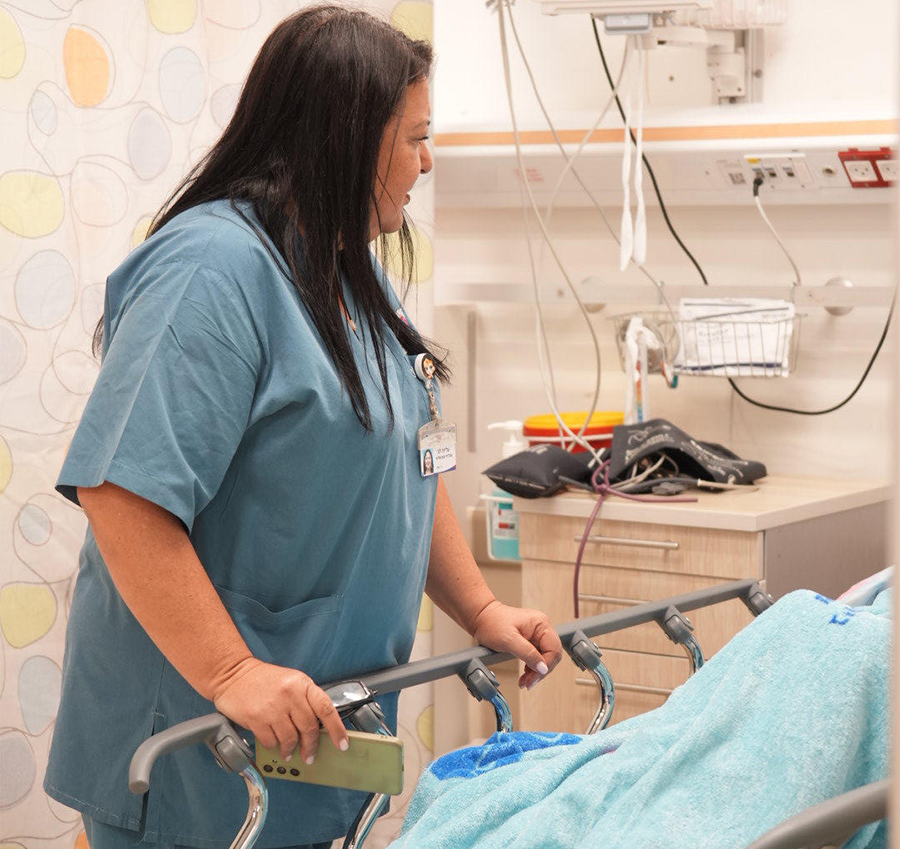Getting your Trinity Audio player ready...
For 28 years, Aliza Lev has been an active and very busy social worker, but what she experienced on the day of October 7 was equivalent to all her years of work combined.
"The number of injured, the dead, the blood flowing onto the emergency room floor, the smells, the sounds of parents' heartbreak upon receiving news, the images of family members with photos of their loved ones, as if taken from a different reality, begging for any shred of information about them. The concentration of this massive, bleeding human wound crying out for help drained almost all of my physical and emotional strength."
Lev, 52, married and a mother of three, is a social worker at Barzilai Medical Center in the children's division and the adult emergency rooms (ER). She woke up on the morning of October 7 to the first siren.
'I saw 'My Dear Wife' flash on the phone screen'
"I heard an explosion, and automatically started getting dressed. My children and husband pleaded with me to stay home, 'They haven't called you yet, why are you running?' Then I received a call from the hospital reporting a house was hit with a baby inside. I live in Ashkelon, just a few minutes' walk from the hospital, so I left immediately, only to be caught by another siren on the way. From that moment, I was caught in a continuous sequence of tragic events."
She arrived at the ER at the beginning of the hectic morning, during which, and in the following days, 685 injured were admitted while the hospital was the target of rocket barrages, one of which hit the children's wing. After confirming that the baby she was reported on was healthy, she was overwhelmed by harrowing scenes.
"I remember a nine-year-old girl arriving with her parents, all Sderot residents. The father was shot and critically injured, arriving sedated and ventilated, his life was at risk. The mother's mental state was severe, and she collapsed. The girl was alone in this cruel situation. I ran to the children's department and brought her some toys. I sat her in my office and promised her I wouldn't leave her."
The girl calmed down, and the two played while Aliza's mobile phone kept sending her notifications. "I was juggling many things at once, overwhelmed like the rest of the staff. The girl and I sat in my office when a nurse called me to the ER and handed me the phone taken from the pocket of a deceased person. I returned to the office, and we continued playing, but my mind was elsewhere as I braced myself to deliver the terrible news to the relatives looking for him."
Shortly after, the dreaded call came. "I saw 'My Dear Wife' flash on the screen. I left the room, signaled to the girl that I’d be back soon, answered the woman, and before breaking the terrible news, told her she could come to the hospital because her husband was in the ER.
“I returned to the room and found the girl from Sderot playing, and my heart broke seeing her sitting alone in a room protecting her from all the horrors just a corridor away. She was in her own innocent world, and the rapid transition I made, from seemingly innocent reality to the peak of horror and pain, was incomprehensible."
When the deceased man's wife and their daughter arrived at the ER, Aliza was called, to the girl's dismay as she refused to part from the first warm and supportive figure she had met at the hospital. The girl was then taken under the care of another social worker.
'Buying a few minutes of hope'
"I met a 50-year-old woman and her daughter in the ER, introduced myself by name, explaining I was the one who answered her call. Along with other staff members, I led the mother and daughter to the room in order to deliver the bad news. From there, at their request, they returned to say goodbye to him."
One tragic event followed another in minutes. "I was called to the bed of a young man around 30 years old who had been rescued from Zikim Beach. I looked at him and saw he wasn’t injured, and he was crying bitterly. Between sobs, he described how his friends' bodies had fallen on him, and he was the only survivor. At that moment, I began to grasp the magnitude of the disaster to the extent that I asked one of the doctors if we had been conquered."
Aliza will never forget the sights and sounds of the emergency room’s doors, with heart-wrenching cries and heart-piercing screams, especially not the worried parents arriving in dozens, if not hundreds, holding photos of their loved ones.
5 View gallery


Blodied stretcher in the hospital after Hamas attack
(Photo: Barzilai Medical Center)
"Nothing is more heartbreaking than a parent frantically worried about their son or daughter, clinging to any hint and asking everyone if they’ve seen them. By procedure, I flipped through the victims' binder, the missing, the dead. I had to compare the photos taken upon their arrival at the ER, some with faces mutilated by human cruelty, to the pictures the parents showed me. Some I had to refer or accompany to the unidentified person center, where photos were taken and hung on the wall to be identified by possible relatives."
The sight of parents with terrified looks and questioning eyes is deeply etched into her memory. She’ll never forget one IDF soldier's mother: "The parents arrived with photos of their son, who was a soldier. I opened the binder and noticed a resemblance to the photos shown to me by the parents. I showed it to the mother, and she seemed to come back to life, 'That's my son; I hope he's alive. I think he's alive.'
“I approached the casualty officer who rechecked and told me the soldier in the photo had died. The mother didn’t leave my side and asked if there was any news constantly, and I answered that the military was checking, buying her a few more minutes of hope."
'She didn’t give up on me'
The casualty officer arrives and asks Aliza to join her in the office, which has suddenly become a room for delivering tragic news. "On that day, I heard the heartbreaking cries of parents and family members, saw people collapsing, but what came out of this mother's mouth was a deafening roar of a bereaved bear.
“An ear-piercing roar. When she was millimeters away from hearing the news about her son's death, before the blow was delivered, I approached her. I gently placed my hand on her, offered her and the father water to drink. As the minutes passed, she calmed down and said, 'Thank you for being with me.'"
By noon, Aliza was called to a 19-year-old soldier’s bed who had been shot in both arms. "He was the same age as my children, and it was so painful to hear him scream, 'I lost my hands, save me.' I approached him, and he immediately asked if I could stay with him. I promised, and then he asked me to promise that he wouldn't lose both of his arms. Later, he begged me to accompany him to the X-ray, and told the doctor, 'Explain it to her, not to me.' I suggested he call his parents, but he firmly refused because he didn't want them to see him without his arms.
“I convinced him, and he called his father. As soon as he heard his father's voice, he burst into bitter tears and said that he had been shot in both arms. I took the phone, introduced myself, and said he was okay, 'Here, he’s talking to you.' This normalized the situation. I accompanied him to the operating room, where they managed to save his arms. When he moved to rehabilitation, he told doctors referring to me, 'She didn’t give up on me.'"
'He was informed of his parents' death and left'
In the evening, after a series of grim messages she had to deliver and intense, soul-draining work, a man around 40 approached her and asked, "Are you Aliza?" She nodded, and he said one of the nurses had referred him to her.
"I asked how I could help, and he told me he was looking for his parents, residents of one of the kibbutzim in the surrounding area, who had been incommunicado since morning. 'I'm not leaving until you find them for me. I'm not leaving without answers.' He showed me pictures of his parents. I looked through my list of names and found no records, not even among the missing. I was at a loss and had no way to help him, but I kept flipping through the pages to give him a shred of hope."
He didn’t leave the ER For six hours, asking every injured person where they were from. Then he asked an older woman where she was from, and when she replied she was from his parents’ kibbutz, a spark of hope lit up in him, only for her to deliver the harsh truth: "They burned all our homes."
Suddenly, the man transformed from a determined adult into an orphaned child, saying, "This can't be. I had a holiday meal with them just last night." At some point, he was informed of his parents' fate and left the hospital.
"In my role, I'm used to seeing difficult sights. It's an inherent part of the job. From accident victims to the sudden bereavement of families losing a loved one, but what I experienced on that cursed Saturday can’t be compared to even the hardest professional experiences I've had throughout my career," Lev concluded.






